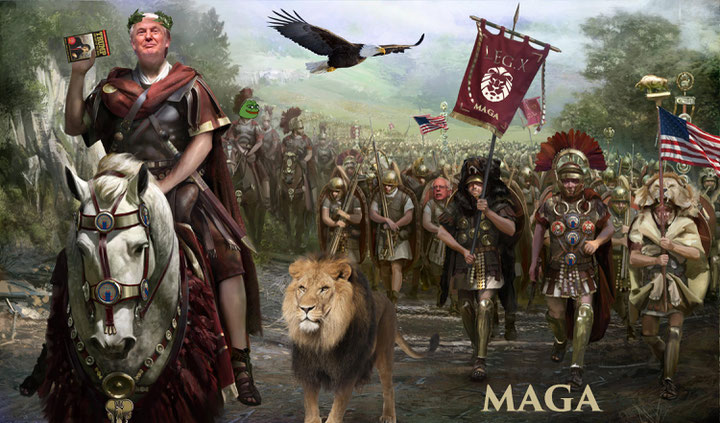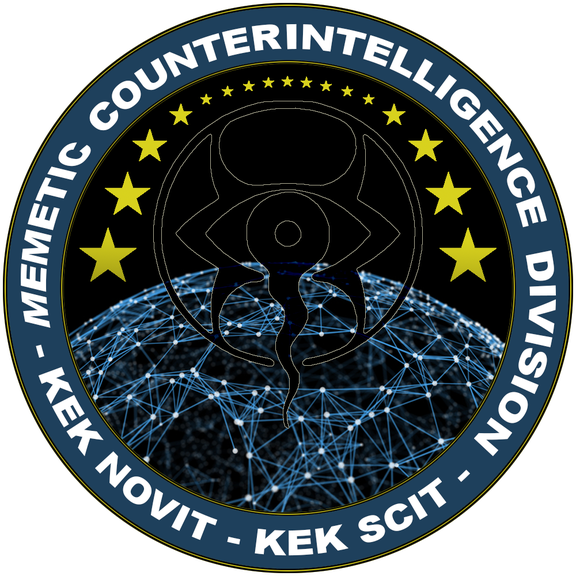Issue 1/2018 - Asoziale Medien?
Meme War – War in the Nets
A conversation between Marc Ries and Maria L. Felixmüller on a central political slogan in social media channels
Social networks play an increasingly important role for political decision-making. Disputes that emerge in this context frequently assume an aggressive or even martial tenor and are often deliberately exacerbated by those involved. What is known as the Great Meme War, conducted on the Internet around the 2016 US presidential election, displays outright paradoxical traits in this respect, particularly when we consider future political processes. But to what extent are the means deployed in this context actually belligerent, absurd or asocial? The conversation between Marc Ries and Maria L. Felixmüller elucidates perspectives that should be considered in this debate.
Marc Ries: I looked at your links on the so-called Great Meme War waged during the 2016 US presidential election. In the light of this phenomenon, one finds oneself compelled to agree with the idea that aggressive, counter-democratic forces exist in the social media, along with a “segregation of incompatible public spheres”. Or isn’t the “social” actually a deeply ambivalent category? When individuals encounter one another, a political space emerges, but at the same time this is also a space of conflicts, indeed a “space of war” – an arena in which disputes are negotiated with a range of “weapons”. Should we therefore assume in connection with the Meme War that a media-based war is an inevitable consequence of social net-spaces? Is it a proxy war? But then it wouldn’t have such an impact, would it? It is a media-based war with real consequences: Trump became President. And what role does Encyclopedia Dramatica (ED) play in all this as a satire Wiki and an “illustration” of the war?1
Maria L. Felixmüller: As an initial reaction, also in the light of representations of the Great Meme War 2016, one could agree with the notion of aggressive net-forces. However, I advocate the idea that the Internet is not one space, but simply offers countless spaces of possibility. I think that the “social” should be viewed as an ambivalent, and perhaps even dialectic, category. The social and the asocial are almost two sides of the same societal coin. Political spaces are created when individuals come together, and these spaces for negotiating disputes, reflecting their precursors from Ancient Rome, are also mostly described as forums, except that the meeting does not occur in the basilica around the corner but rather protected by the anonymity of virtual spaces. The Great Meme War clearly demonstrates that battles are thrashed out in this setting, at least from the perspective of the “warriors”. That is also why I think the entry in the ED. is relevant. You would not find a corresponding entry on the topic in the standard Wikipedia, which instead presents an article with a title akin to your reflection: Social media in the United States presidential election, 20162. Although this summary of the “memetic” events in the course of the US election campaign does not enquire explicitly about the meaning of the meme, the aspect of “war” within a social net-space comes to the fore very clearly, along with the issue of who participates and how they act.
By now I am certain that the “war” is actually a proxy war for some participants. Something similar also applies for example to the Netflix series Punisher (2017), which addresses the motif of the state’s utter indifference to homecoming veterans with an intensity that echoes the film Rambo (1982). The 2017 documentation Stiller Kamerad (Silent Comrade) by Leonhard Hollmann reveals that this is also a problem in Germany. That means it is possible to channel the feeling of not being taken seriously any longer, no longer being relevant as a soldier returning from war, overwhelmed by reality outside the frame of war. The terminology deployed has to come from somewhere after all. The highly real impact generated by all this also becomes apparent in continuing attempts to influence ongoing political and democratic decision-making processes through social networks.
Ries: The ED. page is described on Wikipedia as a “satirical wiki similar to the German-language Kamelopedia, Stupidedia or Uncyclopedia”. The page concentrates on an “ethnology of imageboards and their memes as well as […] sensational episodes”; it is categorized as an “online compendium of troll humor and lore”3. An “oracle of Internet memes” that operates through the prism of schadenfreude: “in lulz we trust”. In what way do you think this kind of troll page is relevant?
Felixmüller: I think it is important for us to take a look too at how ED. sees itself.4 What is interesting in this context is the obvious inversion of the Internet’s advantages into (purported) disadvantages. Individuals who felt constrained by Wikipedia moderators because they were no longer allowed to publish articles founded their own wiki in the form of ED. Here a “segregation of incompatible public spheres” becomes absolutely apparent. One of the advantages of the Internet is that it is democratic, but that also offers scope to give space to everyone.
After the original page was closed down in 2011, it took only a few minutes for a new group to come together to revive the ED. in a newly opened virtual space. Today it sees itself as the forum of an independent society with its own rules, articles and chat options. It is however also aware of its limitations: “Like all websites with user-generated content, ED quickly degenerated into a forum for unfunny revenge attempts by butthurt individuals of every description – bigots, banned website users, trolling victims, failed trolls, and virgins rejected by hot girls.”5
Ries: Is the trolling on ED. “asocial” because it deploys highly overstated racist and cultural stereotypes and plays with schadenfreude (“lulz”) as added value? Or is it productive precisely because of this exaggeration, as an important corrective to denunciation and defamation practised by unfunny, acrimonious hate-filled people? Schadenfreude as an affect of civilisation critique? Satire is after all a concept that has long existed in our culture as a way to criticise circumstances by ridiculing them.
Felixmüller: That is a difficult question and to some extent can only be answered in the light of what resonates with your own sense of humour. For example, I never felt like laughing when watching silent films or YouTube videos where people injure themselves. At the same time though some of my acquaintances laugh their heads off watching 15 or 20-minute compilations on the YouTube channel FailArmy showing incidents in daily life where people hurt themselves by mistake. Nonetheless, I wouldn’t immediately describe ED. as being asocial because it provides trolls with a space in which to act asocially. After all, ED. describes itself as being rooted in The Devil’s Dictionary by Ambrose Bierce (1911), a collection of sarcastic satirical aphorisms in which terms are defined with a good pinch of black humour. That includes the following definition of war: “WAR, n. A by-product of the arts of peace. The most menacing political condition is a period of international amity.”6 Consequently, I would focus more on satire as an affect critical of civilization. It is always helpful to take a look at the forums and various articles in ED. with a critical eye in order to form an opinion about digital modes of behaviour and cultural expression. The dark side of society becomes extremely clear there.
I think that the rule that applies in the German-language area works well, namely that certain content can only be published, presented and made public if it is integrated into a critical framework. In my view, the simple justification “I did it for the lulz”7 is not enough in this context. Even if ED proclaims that it is not racist, the question of integration into critical discourse arises very clearly, and in my opinion it often lacks such integration. However, this does provide a chance to take a look at content that should definitely be considered, reflected on, criticised and discussed. Just because the horrifying content does not appear otherwise in our realms of the Internet does not mean that it does not exist. The ED. demonstrates impressively that in the Net as a whole there is more than enough horrifying material that needs to be considered and noted.
Ries: Shouldn’t our perception of Net culture be more nuanced than a simple division into two camps, the social and the asocial? ED. and similar pages can also be understood as an additional, third option. Directed against binary codes in perception of the societal field, agitations such as those found on ED. reject the communicative consensus and the social “label”, but at the same time also allow for a kind of staging post in the expressive drama of rhetoric and irony. They create distance, from one’s own rage too. Taking fright at certain statements and images is generally followed by a kind of epistemic relief that we are merely observers of various processes of aesthetic (self-) articulation that celebrate their “excess” in the memes – akin to caricatures in satirical magazines. Karl Rosenkranz’ Ästhetik des Häßlichen (Aesthetics of Ugliness) from 1853 identifies subtle hallmarks of caricature precisely in the “freedom and greatness of handling” that “overcomes in its comic nature the negativity of form as of content”. 8 In the meme universe this “handling” refers on the one hand to abandoning proprietary logic, copying and varying icons taken from popular culture, such as Pepe the Frog. On the other hand, the question repeatedly arises of whether trolls are identification figures for adolescents as they can simply get away with doing crazy things?
Felixmüller: I think that we shouldn’t forget that the majority of trolls are adolescents. After all, you need time to do such crazy things. Although here I would define adolescence in a contemporary sense as young people until their late twenties or even mid-thirties. And can trolls actually get away with doing crazy things? That would be like saying that we accept that the cursing figure propping up the bar in our local is entitled to provoke others so that a fight breaks out. Unfortunately it’s simply not possible to prevent many people from mouthing-off when anonymity offers a mantle of invisibility, and it is virtually impossible to throw them out of the pub.
Ries: Why are the imageboards or the meme as a “weapon” so powerful? After all, these are only small images, generally with silly text captions. How are they different for example from the Bots War or verbal abuse?
Felixmüller: Memes are not just images. Memes are first and foremost cultural units. An Internet meme, as defined by Limor Shifman, is always made up of several individual memes. As demonstrated for example by Pepe the Frog9, this meme can appear in very different manifestations, for example as an image or a video. It can also leave the digital realm and take the form of posters, stickers or demonstration banners. Pepe is actually a good example in addressing the issue of how the meme functions as a weapon. In the Great Meme War of 2016 Pepe actually went from being a left-wing liberal, comic “reaction face” to being a figurehead for the alt-right. The frog figure was originally created by Matt Furie for the Boy’s Club comic series, which addressed everyday problems of awkward teenage boys. And let’s not forget: “we’ve all been there”. The drama around Pepe came to a head when Donald Trump identified himself with the figure on 13th October 2015 and retweeted a Pepe with a Trump toupee at the presidential lectern.
Consequently, despairing that the alt-right had appropriated his figure, Pepe’s creator Matt Furie proclaimed the frog dead. It becomes apparent here how difficult it is to kill off a meme. Pepe now no longer has one meaning, but instead several conflicting significations.10 It is impossible to declare that the figure is dead.
This makes very clear how powerful the meme can be as a weapon. Scarcely three months earlier, the first Trump Pepe (Smug Pepe as Trump guarding the fence at the Mexican border) was posted on 4chan. I am fairly certain that Trump is not a participant in this forum, but within a very short time period the Internet meme Trump Pepe had become an alt-right favourite. Trump’s social media feeds certainly overlap with this group.
Memes like this have nothing to do with verbal invective; on the contrary, they function more as identification figures, perhaps similar to the patron saint of a guild. It is Trump, but it is also Pepe. Pepe had already functioned in so many situations as a “reaction face” – irrespective of the underlying political stance –, for example as an emotional memetic mode of expression for desperate teenagers. And we never entirely shed this teenager mentality.
The reasons why this could reach Trump, or rather his Twitter feed, is related to the social bots, and so today the Meme War is generally also a Bot War. Twitter in particular is full of automatically generated tweets, and a study from Oxford has shown that one in three pro-Trump tweets in the US election campaign was generated by a bot.11 In contrast, the corresponding figure for Hillary Clinton was only 22 per cent. The fascinating thing is that bots, which were originally used to automate customer services or to make corrections to user-generated pages like Wikipedia, now serve to sift through Twitter and other social media channels in search of relevant hashtags. These are automatically retweeted, quoted and commented on. Unlike human beings, a bot carries out the task it is set constantly and persistently, making it highly reactive, and it is absolutely independent of external influences, guided only by its programming or rather acting only in keeping with the commands it is given. The perfect soldier, making no decisions itself, because it has no free will. Even if the artificial intelligence we are dealing with in these areas is astonishing – writing complete, meaningful sentences without anyone noticing that it is not human! –, we must not forget that these bots are written, or rather programmed, by human beings and receive their commands from an independent thinking being with free will.12
All of this shows that although the “war” in the digital sphere is conducted with memes and bots, these actually “only” function as weapons. That perhaps holds a key to understanding why the primarily white male Americans within the alt-right who “fought” in the 2016 Meme War do not see themselves as foot soldiers but as generals and commanders who took up arms for their leader, Trump. And by digitally pooling their efforts in battalions for targeted actions, cast as strategic attacks, it unfortunately makes their impact all too real.13
Maria L. Felixmüller lives and works as an artist and a cultural and media theorist in Vienna. Her book Produktive Unordnung: Metamorphosen der Wunderkammer bei Aby M. Warburg und im Internet was published in 2017 by Klampen Verlag. Her artistic research focuses on the historical grounding of contemporary Internet meme culture.
Marc Ries is Professor of Media Theory and Sociology at the Hochschule für Gestaltung in Offenbach (Offenbach School of Design). His most recent publication: On Desire. Biennale des Bewegten Bildes 3, D/E, Bielefeld 2017 (ed. with Bernd Kracke).
Translated by Helen Ferguson
1 See https://encyclopediadramatica.rs/The_Great_Meme_War.
2 https://en.wikipedia.org/w/index.php?title=Social_media_in_the_United_States_presidential_election,_2016&oldid=814131141
3 https://de.wikipedia.org/w/index.php?title=Encyclopedia_Dramatica&oldid=159936013
4 https://encyclopediadramatica.rs/Encyclopedia_Dramatica:About
5 http://cwcpedia.wikia.com/wiki/Encyclopedia_Dramatica
6 Ambrose Bierce, The Devil’s Dictionary; http://www.thedevilsdictionary.com/?w=#!.
7 Cf. the definition of “lulz” at https://www.urbandictionary.com/define.php?term=lulz.
8 See Karl Rosenkranz, Ästhetik des Häßlichen. Leipzig 1996, pp. 309–341 [Orig. 1853]. English translation: Karl Rosenkranz, Aesthetics of Ugliness: A Critical Translation, (ed.) Jason E. Hill and Vanessa R. Schwartz, Bloomsbury Academic, London/ New York: 2015, p.255
9 http://knowyourmeme.com/memes/pepe-the-frog
10 Cf. Lauren Michele Jackson, “A Unified Theory of Meme Death”, in: The Atlantic (7th December 2017); https://www.theatlantic.com/technology/archive/2017/12/a-unified-theory-of-meme-death/546866/.
11 Cf. Philip Howard, A third of pro-Trump tweets are generated by bots, Oxford Internet Institute (20th October 2016); https://www.oii.ox.ac.uk/blog/a-third-of-pro-trump-tweets-are-generated-by-bots/.
12 Volker Bernhard, “Wie die Bürgerbefragung zur Netzneutralität manipuliert wurde”, in: sueddeutsche.de (14th December 2017); http://www.sueddeutsche.de/digital/online-demokratie-wie-die-buergerbefragung-zur-netzneutralitaet-manipuliert-wurde-1.3789882.
13 Cf. Social media in the United States presidential election, 2016 (Note 2).




